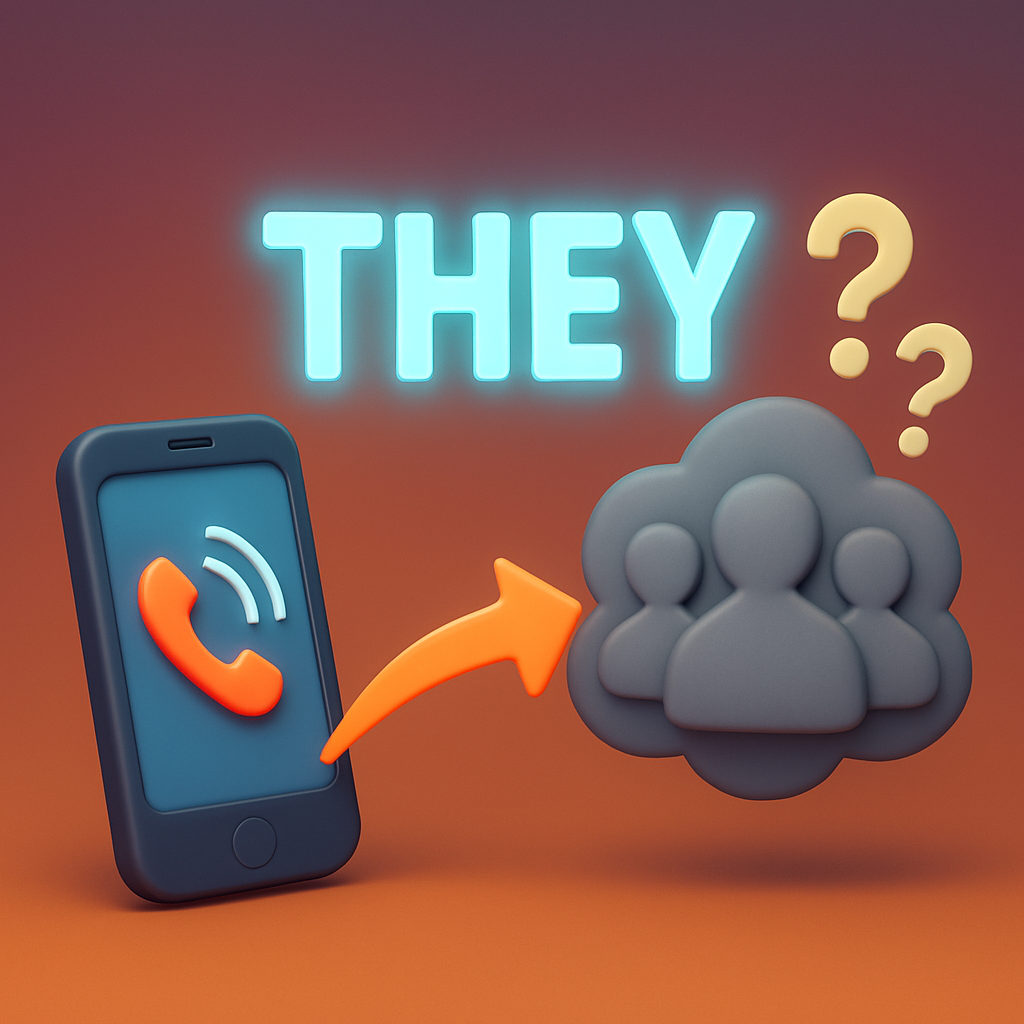They
Definition
The pronoun "they" denotes (1) a third-person plural pronoun used to refer to two or more persons or things previously mentioned or easily identified; and (2) a singular gender-neutral pronoun used to refer to a person whose gender is unknown, unspecified, or nonbinary.
Parts of Speech
- Pronoun
Pronunciation
American English
- IPA: /ðeɪ/
- Respelling: THAY
British English
- IPA: /ðeɪ/
- Respelling: THAY
Etymology
From Old Norse þeir “they” (masculine plural), originally from Proto-Germanic *þai. The form entered Middle English from Old English hīe / hēo (plural “they”). The singular “they” usage as gender-neutral emerged in the 14th century and has become common in modern usage.
Derivatives
- Them (pronoun)
- Their (possessive adjective)
- Theirs (possessive pronoun)
- Themselves (reflexive pronoun)
Synonyms
- Those (demonstrative pronoun, for plural usage)
- He or she (used in singular generic contexts)
Antonyms
- I (first-person pronoun)
- You (second-person pronoun)
- We (first-person plural pronoun)
Usage
"They" appears in both plural and singular contexts. Examples: "They went to the store after school" (plural); "Someone left their bag—maybe they will come back for it" (singular, gender-neutral).
Related Terms
- He: Third-person singular masculine pronoun.
- She: Third-person singular feminine pronoun.
- Them: Objective case of “they.”
- Their: Possessive adjective corresponding to “they.”
- Theirs: Possessive pronoun corresponding to “they.”
Detailed Definitions
Pronoun
- Third-person plural pronoun: Refers to more than one person or thing previously mentioned or easily identified.
- Example: "The students finished their assignments; now they can relax."
- Singular gender-neutral pronoun: Used to refer to a person whose gender is unknown, unspecified, or nonbinary.
- Example: "If someone calls, ask if they will call back; I don’t know who they are."
they



🇨🇳 Chinese (Mandarin)
- 他们 (for people of male or mixed gender)
- IPA Pronunciation: /tʰaː˨˩liːn˧˥/
- English respelling: tāmen
- 她们 (for people of female gender)
- IPA Pronunciation: /tʰaː˨˩liːn˧˥/
- English respelling: tāmen
🇮🇳 Hindi
- वे (for formal)
- IPA Pronunciation: /veː/
- English respelling: ve
- वो (for informal)
- IPA Pronunciation: /voː/
- English respelling: vo
🇪🇸 Spanish
- Ellos (for masculine or mixed groups)
- IPA Pronunciation: /ˈeʝos/
- English respelling: ellos
- Ellas (for feminine groups)
- IPA Pronunciation: /ˈeʝas/
- English respelling: ellas
🇫🇷 French
- Ils (for masculine or mixed groups)
- IPA Pronunciation: /il/
- English respelling: ils
- Elles (for feminine groups)
- IPA Pronunciation: /ɛl/
- English respelling: elles
🇸🇦 Arabic (Modern Standard Arabic)
- هُم (for masculine or mixed groups)
- IPA Pronunciation: /hum/
- English respelling: hum
- هُنَّ (for feminine groups)
- IPA Pronunciation: /hunna/
- English respelling: hunna
🇧🇩 Bengali
- তারা (for animate)
- IPA Pronunciation: /t̪ara/
- English respelling: tara
- এগুলো (for inanimate)
- IPA Pronunciation: /eɡulo/
- English respelling: egulo
🇷🇺 Russian
- Они (for animate)
- IPA Pronunciation: /ˈonʲɪ/
- English respelling: oni
- Их (for inanimate)
- IPA Pronunciation: /ɪx/
- English respelling: ikh
🇵🇹 Portuguese
- Eles (for masculine or mixed groups)
- IPA Pronunciation: /ˈɛlis/
- English respelling: eles
- Elas (for feminine groups)
- IPA Pronunciation: /ˈɛlɐs/
- English respelling: elas
🇮🇩 Indonesian
- Mereka (for people)
- IPA Pronunciation: /məˈrəka/
- English respelling: mereka
- Itu (for things)
- IPA Pronunciation: /itu/
- English respelling: itu
🇩🇪 German
- Sie (for both animate and inanimate)
- IPA Pronunciation: /ziː/
- English respelling: sie
🇯🇵 Japanese
- 彼ら (for people, masculine)
- IPA Pronunciation: /kaɾeɾa/
- English respelling: karera
- 彼女ら (for people, feminine)
- IPA Pronunciation: /kaɲoʑoɾa/
- English respelling: kanojora
🇻🇳 Vietnamese
- Họ (for people)
- IPA Pronunciation: /hɔ˧ˀ˦/
- English respelling: họ
- Chúng (for things)
- IPA Pronunciation: /cɯŋ˧ˀ˦/
- English respelling: chúng
🇰🇷 Korean
- 그들 (for people)
- IPA Pronunciation: /kɯdɯl/
- English respelling: geudeul
- 그것들 (for things)
- IPA Pronunciation: /kɯkʌtdɯl/
- English respelling: geugeotdeul
🇹🇷 Turkish
- Onlar (for both animate and inanimate)
- IPA Pronunciation: /onlar/
- English respelling: onlar
🇵🇰 Urdu
- وہ (for formal)
- IPA Pronunciation: /voː/
- English respelling: vo
- یہ (





